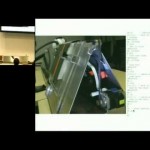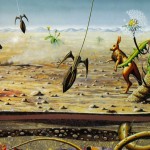 theodp writes “Online education has had a fifty-year road to ‘overnight’ success. MIT Technology Review calls the emergence of free online education, particularly massive open online courses (MOOCs), The Most Important Education Technology in 200 Years. ‘If you were asked to name the most important innovation in transportation over the last 200 years,’ writes Antonio Regalado, ‘you might say the combustion engine, air travel, Henry Ford’s Model-T production line, or even the bicycle. The list goes on. Now answer this one: what’s been the single biggest innovation in education? Don’t worry if you come up blank. You’re supposed to.’ Writing about MOOC Mania in the Communications of the ACM, Moshe Y. Vardi worries that ‘the enormous buzz about MOOCs is not due to the technology’s intrinsic educational value, but due to the seductive possibilities of lower costs.’ And in MOOCs Will Eat Academia, Vivek Haldar writes, ‘MOOCs will almost certainly hollow out the teaching component of universities as it stands today…But all is not lost, because the other thing universities do is research, and that is arguably as important, if not more, than teaching.’ So, are MOOCs the best thing since sliced bread, or merely the second coming of 1920s Postal Course Mania?” Read more of this story at Slashdot.
theodp writes “Online education has had a fifty-year road to ‘overnight’ success. MIT Technology Review calls the emergence of free online education, particularly massive open online courses (MOOCs), The Most Important Education Technology in 200 Years. ‘If you were asked to name the most important innovation in transportation over the last 200 years,’ writes Antonio Regalado, ‘you might say the combustion engine, air travel, Henry Ford’s Model-T production line, or even the bicycle. The list goes on. Now answer this one: what’s been the single biggest innovation in education? Don’t worry if you come up blank. You’re supposed to.’ Writing about MOOC Mania in the Communications of the ACM, Moshe Y. Vardi worries that ‘the enormous buzz about MOOCs is not due to the technology’s intrinsic educational value, but due to the seductive possibilities of lower costs.’ And in MOOCs Will Eat Academia, Vivek Haldar writes, ‘MOOCs will almost certainly hollow out the teaching component of universities as it stands today…But all is not lost, because the other thing universities do is research, and that is arguably as important, if not more, than teaching.’ So, are MOOCs the best thing since sliced bread, or merely the second coming of 1920s Postal Course Mania?” Read more of this story at Slashdot.
View the original here:
MOOC Mania

 In an effort to streamline the process of scanning hundreds of millions of titles, Google Books engineer Dany Qumsiyeh has designed a $1,500 automated scanner from sheet metal, dissected electronics, and a household vacuum. It can chew through a 1,000 page odyssey in about 90 minutes, and you’re welcome to build your own since Qumsiyeh has made his Linear Book Scanner open source . More »
In an effort to streamline the process of scanning hundreds of millions of titles, Google Books engineer Dany Qumsiyeh has designed a $1,500 automated scanner from sheet metal, dissected electronics, and a household vacuum. It can chew through a 1,000 page odyssey in about 90 minutes, and you’re welcome to build your own since Qumsiyeh has made his Linear Book Scanner open source . More » 



 Zooming in on the map, the Web giant introduces a new tool for its crowd-sourced mapping app that lets users share and learn more information about their neighborhoods. [Read more]
Zooming in on the map, the Web giant introduces a new tool for its crowd-sourced mapping app that lets users share and learn more information about their neighborhoods. [Read more]  Keyboards continue their slow march to domination, overthrowing pens and pencils in schools across the nation. [Read more]
Keyboards continue their slow march to domination, overthrowing pens and pencils in schools across the nation. [Read more] 